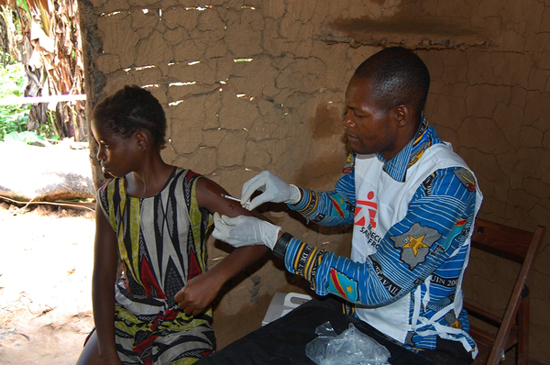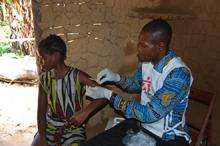A measles epidemic is spreading throughout a vast region of DRC, and shortages of drugs and health staff are putting hundreds of thousands of children at risk.

DRC 2008 © Pascale Zintzen
A girl is vaccinated for measles in Orientale Province.
KINSHASA/BUNIA, DRC, DECEMBER 20, 2012—A measles epidemic is spreading throughout a vast region of the Democratic Republic of Congo (DRC), and shortages of drugs and health staff are putting hundreds of thousands of children at risk, the international medical humanitarian organization Doctors Without Borders/Médecins Sans Frontières (MSF) said today.
Since early October, MSF has treated more than 12,700 patients and vaccinated more than 226,000 children in several areas of Orientale Province. Measles, an extremely contagious illness, can result in serious medical complications and the death of 1 to 15 percent of affected children if not treated in time.
"The disease is spreading rapidly in the province and affects primarily children under 5 years of age," said Dr. Narcisse Wega, MSF emergency coordinator, noting that the epidemic follows a sharp increase in malaria earlier this year. "We are facing a continuing series of epidemics that has overwhelmed the health system. The health authorities are experiencing staff shortages and frequent stock-outs of medicine and cannot address this epidemic on their own.”
Due to the lack of health services in the area, MSF began dispatching medical teams to the Yambuku, Yalibombo, Yaleko, and Yahuma health zones on October 5. More than 76,460 children remain to be vaccinated in Yahuma.
In November, MSF deployed additional teams to the Buta and Ganga-Dingila health zones, where more than 2,000 patients have already been treated. Mass vaccination campaigns began on December 17 and will continue in January, targeting approximately 130,000 children between 6 months and 15 years. The organization is also working in Niapu, in the Poko health zone, and is launching activities in Titulé.
With some 20 health zones affected by measles in Orientale Province, MSF faces huge challenges—primarily logistical—in reaching the most isolated communities and treating people as quickly as possible.
“We are mobilizing all the resources at our disposal to expand our activities into the affected areas, but the province and the needs are huge and we may soon reach the limits of our capacities,” Dr. Wega said. “We can’t deal with this province-wide epidemic alone.”




